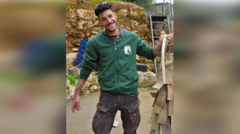Undercover filming in the bustling transport hub of Maai Mahiu, Kenya, exposes the alarming involvement of 'madams' in child prostitution, with evidence highlighting the vulnerability of minors as young as 13 within a complex and largely unregulated sex industry.
Investigative Report Uncovers Child Exploitation in Kenya's Sex Trade

Investigative Report Uncovers Child Exploitation in Kenya's Sex Trade
A new BBC Africa Eye investigation reveals shocking details about child prostitution in Kenya's Maai Mahiu, including testimonies from 'madams' and young girls trapped in a cycle of abuse.
A recent investigative report by BBC Africa Eye has brought to light the distressing reality of child exploitation in the sex trade of Maai Mahiu, a key transport hub in Kenya’s Rift Valley. Undercover investigators have revealed that women, referred to as ‘madams’, have been coercing children as young as 13 into prostitution in this truck-heavy town, exploiting the high demand from passing truck drivers.
The investigation, which spanned several months, involved two undercover operatives integrating themselves into the local sex trade. Their footage captures conversations with madams like Nyambura, who openly discusses the manipulation of minors and acknowledges the illegal nature of their actions while continuing to provide access to underage girls. Nyambura's chilling remark reveals how easily children can be lured into prostitution, saying, “They’re still children, so it’s easy to manipulate them by just handing them sweets.”
The town of Maai Mahiu, located roughly 50 kilometers east of Nairobi, is notorious for its sex industry—fueled by the enormous traffic of goods and individuals to Uganda and other neighboring countries. This investigation underscores the normalization of prostitution in the area, with statements from madams indicating that it is perceived as a viable source of income. However, despite the apparent prevalence of the practice, the enforcement of the law on child prostitution appears woefully inadequate, resulting in a lack of arrests and convictions.
The striking evidence collected by the BBC has been submitted to Kenyan authorities, but earlier efforts to locate both the madams and their young victims have been unsuccessful, leaving many in a precarious situation. Child trafficking carries severe penalties in Kenya, yet testimonies from vulnerable minors—which police desperately need for successful prosecutions—remain difficult to obtain due to fear and stigma.
The investigation has not only exposed systemic failures but also emphasizes the individual stories of young girls trapped in this grim cycle. Interviews with these minors reveal harrowing experiences of daily abuse and coercion, with some girls reporting that clients sometimes force them to engage in unprotected sex simply because they are too afraid to refuse.
Additionally, the report brings attention to former sex workers like “Baby Girl,” who now dedicate their lives to helping young women escape the brutal realities of the sex industry. For many of these individuals, the escape from abuse is only the first step in a long journey to recovery. As one survivor, Lilian, expressed, the support she receives is crucial to overcoming her traumatic past.
Despite the obstacles, Baby Girl has been instrumental in providing a refuge and skill development for these young women, although her outreach programs face looming threats after recent US funding cuts. Her work, which includes advocacy for safe sex practices in a region heavily affected by HIV, is critical for the health and well-being of vulnerable populations.
With the results of this inquiry now public, many hope that increased awareness will lead to tighter regulations and a comprehensive strategy to combat child exploitation in Kenya's sex trade, ultimately ensuring that the rights and lives of its youth are protected.





















